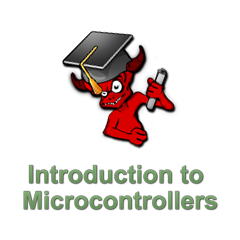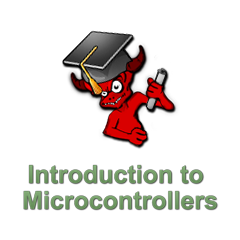Categories
- animatronics (12)
- apple (11)
- arduino (179)
- art (41)
- articles (121)
- artificial intelligence (11)
- automation (421)
- avr (205)
- bitcoin (3)
- breadboard (9)
- cameras (57)
- cars (26)
- cell phones (28)
- clothing mods (21)
- console mods (26)
- dangerous (94)
- desktop mods (24)
- embedded (5)
- flying things (54)
- fpga (22)
- gaming creations (108)
- interface (225)
- internet (17)
- laptop mods (6)
- lasers (22)
- linux (7)
- magnetic (3)
- medical (12)
- microcontrollers (51)
- misc projects (152)
- msp (12)
- music (124)
- pic (90)
- projects (23)
- pyroedu (76)
- raspberry pi (26)
- robots (312)
- security (36)
- sensors (307)
- software (200)
- solar (19)
- stamp (9)
- tools (149)
- tutorials (98)
- Uncategorized (45)
- usb (44)
- wireless (256)
Sponsors


Posted April 24, 2014 by Chris
Time for another PyroEDU Lesson, this time we’ll turn our focus to microcontrollers and Communication with a PC in our new course: An Introduction To Microcontrollers. Here’s an overview of the lesson:
"Most microcontrollers operate in an environment where they need to talk to other computers. In this lesson, we will use serial communication with our laptop to send commands to our microcontroller."

Posted April 17, 2014 by Chris
This week we’ll turn to take a look at a very important concept of Polling vs. Interrupts in our new course: An Introduction To Microcontrollers. Here’s an overview of the lesson:
"In order to interface to the analog world, microcontrollers often have an internal analog-to-digital converter. In this lesson, we will test the converter to understand how it works."

Posted April 10, 2014 by Chris
Now for some real fun, we’ll take a look at how to convert from Analog to Digital in our new course: An Introduction To Microcontrollers. Here’s an overview of the lesson:
"In order to interface to the analog world, microcontrollers often have an internal analog-to-digital converter. In this lesson, we will test the converter to understand how it works."

Posted April 3, 2014 by Chris
This week we’ll be looking further into microcontrollers with some Timers and Timing in our new course: An Introduction To Microcontrollers. Here’s an overview of the lesson:
"All processors use a master clock frequency to execute instructions and microcontrollers are no different. In this lesson, we will explore the relation between processor speed, instruction timing, and internal timer modules."

Posted March 27, 2014 by Chris
Time for some good old fashioned microcontroller Input and Output! The third lesson in our new course: An Introduction To Microcontrollers is now live. Here’s an overview of the lesson:
"All microcontrollers have general purpose input and output pins, often called GPIO. Here we will take a look at how to build a program and hardware to accept push-button input in order to affect output LEDs."

Posted March 20, 2014 by Chris
Are you ready to say Hello World? Today we’re releasing the second lesson in our new course: An Introduction To Microcontrollers is live. Here’s an overview of the lesson:
"Building a ‘hello world’ application signifies a time honored approach to learning how to program. In this lesson, we will explore the first steps necessary for building and loading programs onto a microcontroller."

Posted March 13, 2014 by Chris
Today we’re happy to announce that lesson 1 of our new course: An Introduction To Microcontrollers is live. Here’s an overview of the lesson:
"Want to learn about microcontrollers? Please start here! This lesson explains the course content, what expectations you should have and what parts are needed for the course."

Posted March 6, 2014 by Syd
We are just one week away from publishing PyroEDU’s fourth course, An Introduction to Microcontrollers and we’re really excited to share it with you. Our friends over at Gadgetory.com are offering parts kits that provide all the materials necessary to complete the course. If you’ve bought a kit for a previous PyroEDU course, all you need is the Components Kit. If this is your first time buying a kit, you will want the Complete Kit.

Posted February 27, 2014 by Chris
Thanks to continued support and feedback from all of YOU, we are excited to announce that the 4th course of PyroEDU: An Introduction To Microcontrollers will begin next month! Here’s a preview of the course overview:
“This course is meant to create a pathway into learning about microcontrollers, for people who are scared of the hardware and software trickery that comes with it. A hands-on approach is taken in this course through a combination of lecture and experimentation to teach you about the different functions that microcontrollers have. Additionally, visuals are used throughout lectures like step-by-step schematic building and line-by-line code explanations.”
This course comes right on the heels of An Introduction To Digital Electronics and An Introduction To Analog Electronics and as such, it will use knowledge from both of those courses to further expand to the world of processors, microcontrollers and programmed devices in general. Also, thanks again to all of our kickstarter backers who originally got us started! Read more at the course page at PyroEDU

Posted October 31, 2013 by Chris
And now for the final lesson in our PyroEDU Analog Electronics course! In this Lesson, we will take a look at how to make an Audio Amplifier. Here’s a quick intro of what this PyroEDU lesson is all about:
Designing a general purpose audio amplifier is a time tested favorite project of many electronics students. It shows that you are comfortable with building circuits and that you can actually make something useful! In this lesson, we will go through the process of designing a simple audio amplifier to make a very quiet audio signal really, really loud.






